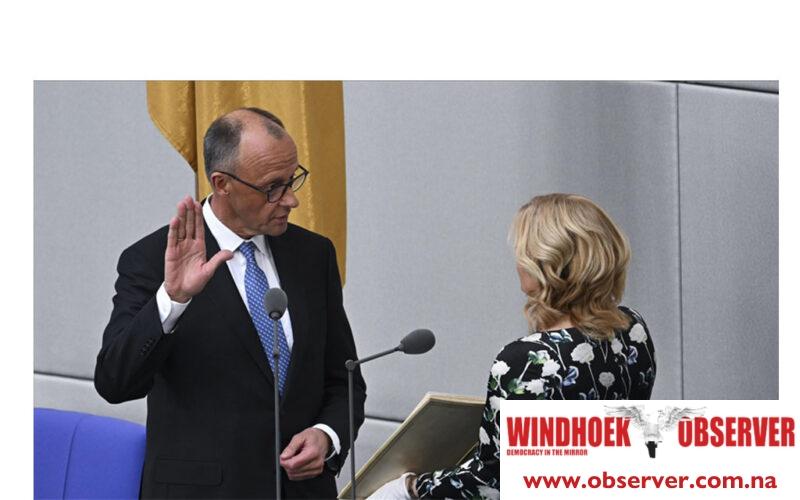Justicia Shipena
The election of Friedrich Merz as Germany’s chancellor implies that there is no longer a straightforward declaration or commitment to confront the genocide deal, says political analyst Henning Melber.
Melber cautions that even simple symbolic actions, such as the unified proclamation against genocide, may not be realised under Germany’s new administration.
Merz was voted as Germany’s future chancellor on Tuesday after winning a second Bundestag vote. While the previous “Ampel” coalition, which included the Social Democratic Party (SPD), the Green Party, and the Liberal Party, explicitly committed to completing the joint declaration on genocide committed during Germany’s colonial rule in then-South West Africa (now Namibia), the current coalition agreement makes no such reference.
Instead, the new treaty, according to Melber, only references steps to strengthen the restitution of plundered colonial artefacts and human remains, with Namibia conspicuously absent.
Merz, the conservative bloc’s leader, failed to obtain an absolute majority in the first ballot, falling six votes short, a first in postwar German history.
For the first time in German legislative history, a chancellor was elected through two rounds of voting.
Melber told the Windhoek Observer that the newly established coalition between the CDU and the SPD is off to a rough start.
He said the coalition’s tumultuous start raises questions about its capacity to maintain stability during its tenure.
Merz’s coalition, which includes the Social Democrats, now controls 328 seats, but 18 MPs are said to have withheld support.
After hours of uncertainty, a second vote was held.
Merz received 325 votes, giving her a slender nine-vote majority.
Melber reminds that previously in the discussions, the SPD submitted language in support of the genocide proclamation under its cultural and international affairs portfolio.
However, the initiative was apparently scrapped after it became evident that the CDU would dominate the foreign ministry.
“The CDU’s newly appointed foreign minister has no track record in African affairs, raising concerns about Germany’s future engagement with the continent,” Melber stated.
He noted that the selection of a controversial man with white nationalist beliefs as state secretary for culture in the chancellor’s office has concerned onlookers even more.
“This came as a surprise, even within conservative circles,” Melber said, expressing worry about the impact such an appointment may have on Germany’s commitment to historical reconciliation.
According to Melber, Germany’s actions towards the Global South, particularly Namibia, are likely to be guided largely by economic considerations rather than historical duty.
“There won’t be a true sign of remorse or atonement,” he added, stressing that the colonial heritage is now further from Germany’s political agenda than it was previously.
The growth of the far-right Alternative für Deutschland (AfD), which has gained political clout, is projected to make any legislative debate on these subjects more poisonous, deterring government involvement in delicate issues such as genocide recognition.
Melber emphasises Namibia’s growing relations with non-Western allies, such as Russia, China, and North Korea, which contribute to the diplomatic gap.
“In today’s geopolitical atmosphere, positioning is important,” he said.
Namibia’s alliance with despotic governments undermines Western capitals’ political resolve to rectify past injustices, he added.
Earlier this year, Germany’s far-right AfD won more than 20% of the vote.
During that period, analysts expressed doubts about the conclusion of the 1904–1908 genocide negotiations.
No changes expected
Following years of discussions, Germany formally acknowledged the genocide committed against the Nama and Ovaherero peoples under colonial authority in 2021.
As part of the deal, Germany promised €1.1 billion (roughly N$22 billion) over 30 years to fund development initiatives in impacted areas.
However, the agreement has been met with opposition from many genocide survivors, who argue that it does not represent direct compensation and was reached without their full participation.
According to reports, Namibia’s Cabinet mandated that the joint proclamation be signed by March 2025.
Despite this during her State of the Nation speech at Parliament last month President Netumbo Nandi-Ndaitwah stated that Germany had committed to giving more resources in excess of the €1.1 billion pledged in the ongoing discussions.
Marius Kudumo, an international relations analyst, says he does not see any substantial changes in Namibia’s developmental assistance or the genocide, apology, and restitution processes.
He stated that Germany will concentrate on internal matters, both inside Germany and beyond Europe, particularly its support for Ukraine.
“Established democracies have established institutions that continue to perform general state functions irrespective of the party in government,” Kudumo said.
Kudumo also told the Windhoek Observer that Germany as a state has definite aims and anticipated outcomes in genocide discussions and that he is not persuaded that Namibia has strategically positioned itself to attain the required outcomes. Meanwhile, Nandi-Ndaitwah congratulated Merz on his victory as the next chancellor.
The Head of State reflected on the two nations’ relationship, adding that despite our shared but tough past, the two countries have achieved success in collaboration.
She spoke about the task, which includes increasing multilateral efforts at the United Nations.
The two countries co-chaired the United Nations Summit on the Future in September of last year, which culminated in the approval of the Pact for the Future.
Nandi-Ndaitwah expressed interest in working with Merz to build the friendship.
“I am looking forward to working with Chancellor Merz to enhance our friendship and strive harder to expand collaboration for the sake of our two countries.”
Between 1904 and 1908, German colonial soldiers committed crimes against the Herero and Nama people.
The killings were part of a German programme of collective punishment, which is widely acknowledged as the first genocide of the twentieth century.
However, Namibia and Germany have been enjoying strong bilateral connections that have been developed over the last 35 years, with Germany investing over €1.6 billion (about N$35 billion) in Namibia’s growth since 1990.




